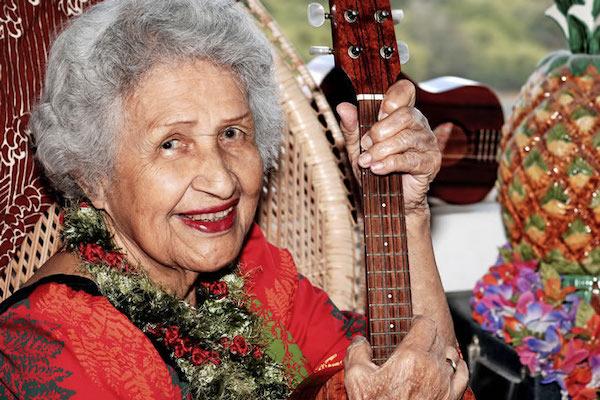Genoa Keawe

Photo by Tom Pich
Bio
The human voice has always been at the center of Native Hawaiian music, from the ancient mele chant to the lively social music known by the pidgin term chalangalang. With the rise of radio and the recording industry in the first half of the 20th century came the opportunity for chalangalang musicians to be recorded and heard more widely. Some of the most successful recording artists became the models for the tradition in the second half of the century. "Auntie Genoa" Keawe was among the most celebrated and influential of these models.
Born in 1918 in the area of Oahu known as Kaka'ako, she began her music training at age 10 when she began singing in the choir of the Mormon Church. She left school after the eighth grade, married her husband Edward when she was 16 and began her family of 12 children. She learned the Hawaiian language from her mother-in-law and began singing Hawaiian music in both Hawaiian and English for military clubs prior to World War II. She also appeared on the radio with John Kamealoha Almeida and with the Honolulu Rapid Transit musicians. Alice Namakelua particularly helped her with her Hawaiian language phrasing and vocal style. In 1946, she recorded the first of over 140 singles on the 49th State record label, and her group, known as Genoa Keawe and Her Hula Maids and Genoa Keawe and Her Polynesians, backed up other singers on many other recordings. Many of her songs, recorded from the late 1940s to the early 1960s, became mainstays of the Hawaiian music repertoire and have been reissued on more recent recording anthologies. In 1966, she started her own record company, Genoa Keawe Records. Hawaiian ethnomusicologist Amy K. Stillman describes Keawe's importance to Hawaiian music: "In addition to her unrivalled falsetto technique, bell-like yodeling, and her trademark ability to hold high notes for over two minutes, Genoa Keawe is particularly significant for her focus on presenting repertoire for modern hula, i.e., hula performed to westernized melodies and the accompaniment of western instruments such as guitar and ukulele. She operated a hula studio in Pauoa for many years, and has served as a resource for scores of Hawaiian musicians throughout a career that has spanned over 50 years." Her warm, caring personality earned her the nickname "Auntie Genoa" -- accepted and used by all her admirers to this day -- early in her career.
Over her long career she has earned numerous accolades, including multiple Na Hoku Hanohano awards, the Hawaiian music industry's equivalent of the Grammy awards. In 1987, the King Kamehameha Hula Competition was dedicated to her, as was the 1998 Prince Lot Hula Festival. Perhaps her greatest award, though, is her continued ability to sing, her "gift from God," as she puts it. "It's a gift I asked for. . . . I wanted to be a singer, so I prayed every night, and thank God I still have it." At the age of 81, she continues to perform weekly at the Hawaiian Regent Hotel, sharing her gift with others. "Hawaiian music must go on," she says. "As long as Genoa Keawe is alive, it will still live."

